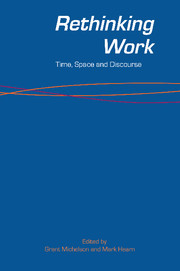Book contents
- Frontmatter
- Contents
- Tables and Figure
- Contributors
- Editorial Statement
- Abbreviations
- 1 Going to a New Place
- PART I TIME
- PART II SPACE
- 7 Union Power
- 8 Globalisation and Labour Mobility
- 9 A Spatial Perspective on International Work and Management
- 10 Markets and the Spatial Organisation of Work
- PART III DISCOURSE
- COMMENTARY
- Index
10 - Markets and the Spatial Organisation of Work
Published online by Cambridge University Press: 05 June 2012
- Frontmatter
- Contents
- Tables and Figure
- Contributors
- Editorial Statement
- Abbreviations
- 1 Going to a New Place
- PART I TIME
- PART II SPACE
- 7 Union Power
- 8 Globalisation and Labour Mobility
- 9 A Spatial Perspective on International Work and Management
- 10 Markets and the Spatial Organisation of Work
- PART III DISCOURSE
- COMMENTARY
- Index
Summary
Industrial relations as an area of study developed, to a large extent, in response to marginalist economic analysis of markets. Marsden (1982: 236–8) has argued that the origins of industrial relations as a focus of inquiry lies in the inability of orthodox economics to explain labour supply. Kaufman (1993) makes a similar claim, charting the growth of institutional labour economics in the USA as the forerunner of the development of industrial relations in that country. Notwithstanding this genesis, the concept of a ‘labour market’ has been embedded in analyses of industrial relations phenomena from its very beginnings. For many industrial relations writers the operation of the labour market, far from being the competitive one depicted by orthodoxy, is shaped by the agency of buyers and sellers. This agency is expressed through institutional forms and more often than not is constrained or facilitated by the prevailing conditions around labour markets. While much industrial relations analysis empirically challenges the operation of the labour market as described by marginalist economics, it has not on the whole challenged the theoretical foundation of abstract market behaviour.
Herein lies the paradox of industrial relations and the study of work. While often cataloguing empirically the construction and reconstruction of labour and product markets, industrial relations has not developed an effective theoretical alternative to mainstream economics. The result is twofold.
Information
- Type
- Chapter
- Information
- Rethinking WorkTime, Space and Discourse, pp. 187 - 210Publisher: Cambridge University PressPrint publication year: 2006
Accessibility standard: Unknown
Why this information is here
This section outlines the accessibility features of this content - including support for screen readers, full keyboard navigation and high-contrast display options. This may not be relevant for you.Accessibility Information
- 4
- Cited by
